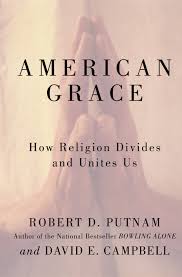A new theoretical study might claim that non-religious kids are more altruistic and less judgmental, but the real-life evidence suggests that having faith provides an impetus towards generosity, writes Simon Smart.
As if we needed another reason to ditch church on Sunday mornings and head for the beach instead, it turns out that plonking the kids in church, mosque or synagogue will more likely produce mean, judgmental little prigs, compared to the more generous sprogs of secular households.
A study out of the University of Chicago this week produced hand-rubbing headlines confirming what many have suspected for a while now – religion wrecks most things and we are right to think we've grown out of it and moved on, and that better days lie ahead as a result.
 Sunday school teachers all over the country must have choked on their Weet-Bix reading reports of children from secular homes behaving in more altruistic and less judgmental ways than those raised in religious homes.
Sunday school teachers all over the country must have choked on their Weet-Bix reading reports of children from secular homes behaving in more altruistic and less judgmental ways than those raised in religious homes.
A total of 1,170 kids aged from five to 12 years from six countries took part in the study. Of them, 23.9 per cent identified as Christian, 43 per cent were Muslim, and 27.6 per cent from non-religious households. (Other faiths represented were too few for the stats to count.)
Children were shown a set of stickers and were told there were not enough to go round for all children in the school to see if they would share. They were also shown images depicting interpersonal harm like pushing and bumping to see how they would respond.
The researchers say their results “robustly demonstrate that children from households identifying as either of the two major world religions (Christianity and Islam) were less altruistic than children from non-religious households”. This finding is more pronounced for children who are older and have thus been exposed to religious activity for longer.
Further, they say, children “frequently appear to be more judgmental of others' actions”, with Muslim children considering harsher punishment appropriate for those causing interpersonal harm than those from Christian families. Children from non-religious homes were the least “judgmental” according to the study.
What to make of all this? Every study has its limitations and, of course, this one is no exception. Leaving aside the criticisms being made from various quarters of the study's methodology and apparent biases, it does still seem odd that at no point in this research is there an attempt to define altruism or religiosity. What is considered “judgmental” could, from another angle, be merely considered empathetic. I would be pleased if my own children were concerned about kids mistreating others.
The problem is, despite the theoretical experiment that produced these results, the weight of evidence for real world experience looks completely different.
But the research comes from a reputable institution and makes some interesting theoretical findings. The sample size is not insignificant. It shouldn't be summarily dismissed by the devout.
The researchers make the fair point that the relation between religion and morality is a contentious one. It ought not to be controversial to say that people of no faith are capable of and frequently do live extremely admirable lives. In some cultures those who are not religious are thought of as morally suspect. In the US it is still very hard for non-believers to be elected to public office and this is rightly challenged by the researchers in this case.
But it does feel like overreach when they claim that “our study show(s) … that religious people are less generous and not only adults but children too”. Or when they suggest that the secularisation of moral discourse would “increase rather than decrease human kindness”. That's quite a grand historical global-scale claim to make from a study of this size and scope.
The problem is, despite the theoretical experiment that produced these results, the weight of evidence for real world experience looks completely different. One might recall Robert Putnam's American Grace: How religion unites and divides us (2010), which emerged from two comprehensive surveys conducted into religion and public life in America.
Putnam reports that on every measurable scale, religious Americans are better volunteers, more generous financial givers, more altruistic and more involved in civic life, than their secular counterparts. Religious people are better neighbours, more community-minded, more likely to volunteer, and not just for church activities. They are more likely to give blood, to give money to a homeless person, to provide financial aid to family or friends, to offer a seat to a stranger and to spend time with someone who is “a bit down”. The list goes on.
 America is a generous nation, but there is a sharp difference between religious Americans and secular Americans in terms of giving. Putnam reports that: “Virtually every part of the American philanthropic spectrum benefits disproportionately from giving by religiously observant men and women, but this is especially true for organisations serving the needy.”
America is a generous nation, but there is a sharp difference between religious Americans and secular Americans in terms of giving. Putnam reports that: “Virtually every part of the American philanthropic spectrum benefits disproportionately from giving by religiously observant men and women, but this is especially true for organisations serving the needy.”
Putnam is impressively credentialed and highly regarded in his field. He is not a religious believer in any conventional sense. Moreover, his findings were so striking he decided to repeat the research and indeed replicated the results – not a bad idea for this recent University of Chicago study!
The religious landscape is very different in Australia compared to the US and there is far less data to work with. What we do have, however, points in a similar direction to what Putnam found. In terms of measures of generosity religious believers score highly. A Roy Morgan poll of 2014, drawing on a sample size of 16,809 found: “The average Australian gave $288 to charity in the year to June 2014. Those who did not identify with a religion donated on average $221 while those who identified with a religion gave an average of $331.” That's 50 per cent more giving to charity by religious Australians.
In his book Disconnected (2010), which examines the fraying of Australia's social fabric, Labor MP Andrew Leigh, who is an atheist with a PhD in social science from Harvard, writes of the undeniable benefits to the community of church attendance:
Among churchgoers (those who attended a religious service in the previous month), 25 per cent also participated in a community service or civic association over the same period. By contrast, among non-churchgoers, just 12 per cent participated in a community or civic association.
Regular churchgoers are 16 percentage points more likely to have been involved in a voluntary activity, and 22 percentage points more likely to have helped the needy…
…Churchgoers are more likely to build friendships with people from a different social class. Those who attend church regularly are more likely to say that they can count among their friends a business owner, a manual worker, or a welfare recipient. Few other institutions in America or Australia are as effective in fostering this “bridging” social capital between rich and poor.
There is no doubt that the impact of religion matters a great deal. The world is becoming more religious, not less, so it is a fair question whether the impact is, overall, positive or not. The recent study of religious children should make believers think carefully about what they teach kids, how it is interpreted, and how that impacts behaviour.
But it might be a little too early to declare that without religion we'll all be better off. It's still the case that almost all the major charities in this country are faith based. There's every chance that if you go to visit your Grandma in the dementia ward this weekend, the organisation in which she is cared for emerged from a deeply held Christian understanding of charity. For those unfortunate enough to have a brother lost to homelessness, it's more likely than not that when he is picked up off the street or accesses help at a soup kitchen, those caring for him will be attached to a Christian institution. Outside of experimental conditions, these are the real world experiences of countless thousands.
Plenty of people today do this kind of work without any faith, but it remains the case that a grounding in the Christian faith and, importantly, commitment to a faith community, continues to provide an impetus towards generosity, mercy and kindness. All of us are beneficiaries of that.
Simon Smart is the Director of the Centre for Public Christianity. He is the co-author with Jane Caro, Antony Loewenstein, and Rachel Woodlock of For God's Sake: An Atheist, a Jew, a Christian and a Muslim Debate Religion.
This article first appeared at The Drum.


